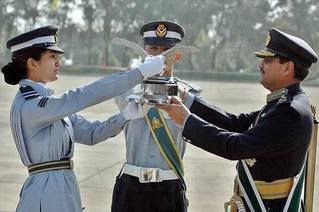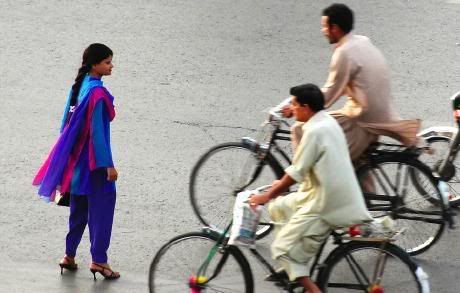Mehr Un Nisa
As much as I’m proud of my culture, the unnecessarily sharp lines drawn between the roles of men and women, is something I can never imagine myself defending. And no matter how liberal an environment you’re living in, the distinction keeps on surfacing in ways that are almost imperceptible.
Petty example: Have you ever noticed how the Director Security at every big event or conference is invariably a male? “Come on, it IS a guy’s job – you can’t make a fuss about that now”, if these aren’t the first words coming to your mind after reading the example, we’re friends.
A more interesting observation that says much about the status of technical training in Pakistan as well as where we stand with respect to the progressive ideals we claim to have is the following: we have absolutely no professional female maintenance workers in Pakistan. It is not unusual for a girl to be kicked out of her room where repair work is to be done, with this innocuous statement, “Baji, aadmi aye hain kaam kernay.”
It leaves you wondering whether the idea of a female plumber, electrician or a carpenter is really as ridiculous as some people would have you believe? What is it in wiring some circuits, basic plumbing or fixing a cable that requires a man’s strength? Women do these jobs in so many countries in the world, after all.
So, why not in Pakistan?
There is the inevitable question of whether our society is ‘ready’ for it or not. As far as I have observed, the educated elite has always been appreciative of measures aimed at women’s independence and empowerment. But of course, the educated elite cannot be taken as an accurate representation of the majority of the population, so let’s look at the villages.
But there in the Pakistani villages, as opposed to the picture painted by your fifth grade Urdu textbook, you see women working in the heat of fields as well as brick-kilns and even as road-side vendors. The word ‘mazdoor’ has no gender in these places.
It’s mainly in the urban middle-class and in feudal systems where men feel this need to assert their masculinity and subdue women in face of the ‘corrupting influences’ of modernity. Unfortunately, the number of people
with the regressive mind-set that needs to be challenged is huge. The challenge to these regressive forces, therefore, has to be well-organized, government-enforced and focus on changes within Pakistan’s technical education system.
The government could establish vocational training institutes where women along with men are especially educated to work as mechanics, electricians, rescue workers, plumbers etc. Such a place would actually be an excellent respite for the poor who cannot afford to pursue academics but definitely want to learn a skill that could earn them money and run their households.
Moreover, the notion of being formally trained or educated would add to the self-esteem these women (and men); and in general this may be a step towards giving the blue-collar workers the respect that they deserve in our society. Also, the presence of female industrial workers could actually take us a long way establishing ourselves a progressive society, by forcing people to change their attitudes. And who knows, the enhanced work-force could even be an incentive for the government to move towards developing indigenous technology and cut down on our habit of importing every little pin that the country needs.
My views may sound very idealistic and may even be flawed at more places than one. But one thing I’m sure of is that inducting a few female pilots, paratroopers and traffic wardens in this country’s elite institutions while good, is not enough. Women empowerment in the poor working-class still needs to see the light of the day. Change – in order to carry any meaning at all – must seep into the masses.























































Even more meanwhile, (these meanwhiles are getting to me now)
KARACHI: Pakistani Scholar Dr. Hina Siddiqui won the best “Oral Presentation Award” in the 11th Eurasia conference on Chemical Sciences. The international conference was held in Jordon from Oct.6 to Oct.10, 2010.
Dr. Siddiqui’s presentation was declared as one of the top three oral presentations in the conference, where a panel of experts decided upon the top three finalists. Another scholar from Peshawar also got prize in the event, where over 200 scientists delivered their presentations from 69 countries.
Eurasia Chemical Sciences conference was launched by three chemists in 1988 to foster network and knowledge sharing among the researchers of North and South.
The inspiring sentence
Dr. Siddiqui is a PhD in organic chemistry and currently working as research officer at International Center for Chemical and Biological Sciences (ICCBS) at Karachi University.
When she was in school, she read an inspiring interview of Prof. Dr. Atta-ur-Rahman from Hussain Ebrahim Jamal (HEJ) Research Institute of Chemistry, University of Karachi, published in a well-known Urdu science magazine named Amali Science.
In that Dr. Atta-ur-Rehman said institutions are not made up from bricks and stones rather they are made up of people who have dreams and vision.
The sentence changed Siddiqui’s vision and she devoted herself to exploring the unknown. In 2005, she joined HEJ and started her Ph. D under supervision of Prof. Dr. Mohammad Iqbal Choudhary, during her Ph.D Studies she worked on the anti-oxidant properties of various chemical constituents, also she got UBF (Umear Basha Foundation) scholarship and went to University of Kansas for one year to excel in Organic synthesis research.
In the Eurasia conference, a shield and certificate was presented to Siddiqui and the organisers also waived the registration fee of upcoming 12 Eurasia Conference on Chemical Sciences which will be held in Greece in 2012.
Siddiqui told Dawn.com that it is not her prize but it is HEJ award because in HEJ every student gets a world class education and training to excel anywhere in the world.
Siddiqui said that HEJ is a great place to shine, because it is an equal opportunity institute where merit is the only criteria rather than gender discrimination. She urged the females to consider research as their career and vows to continue research and development in the future.
Source: dawn dot com
She urged the females to consider research as their career and vows to continue research and development in the future. Surely, a male (not a man?) wrote up this column when he used the word “females”. Yep that would be a male alright. Just confirmed it.
Ah well, the poor reporting continues though (so what else is new; who will keep our media honest?). Does not mention what was the topic for this “female”. Nor for that matter who and what was the topic of the other scholar from Peshawar. No word if the other scholar was a “male” or a “female” either. Best guess: male.